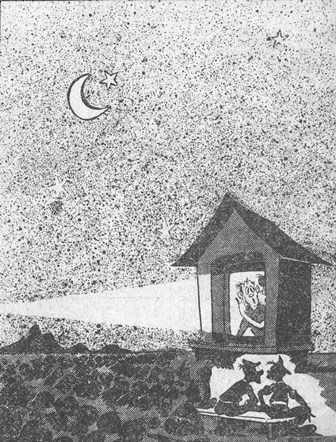
W.D. HOPES TO DISCHARGE 5,000,000 WITHIN 12 MONTHS, SAYS STIMSON The War Department will try "desperately" to discharge 5,000,000 personnel within the next 12 months. All men in the U.S. and all men arriving from overseas with 85 or more points will be immediately sent to Separation Centers for discharge. Essential classifications, now numbered at 19, will be reduced to a "few." Military necessity should not delay many releases. The critical score of 85 for enlisted men and 44 for enlisted WAC's has not been changed. Men 38 years and older will be eligible for discharge 90 days after their application. To encourage men to enlist in the regular army, discharged personnel will be given up to three months to re-enlist after discharge. They will be given a re-enlistment bonus and immediately promoted to the grade held at discharge. The War Department limited this re-enlistment opportunity to "qualified" personnel, not explaining the use of the word "qualified." PACIFIC TROOPS The War Department also denied reports that no more American troops will be sent to the Pacific. Following telegrams to Congressmen and the press, members of the 95th and 86th Divisions, now awaiting transportation to the Pacific at the request of Gen. Douglas MacArthur, were assured all personnel will be screened. Only men under 33 and without excessive combat service will be sent abroad. Both divisions served in the EfsTO. The Navy also announced a discharge point system this week.
COAST GUARD PLANS The Coast Guard will follow the same discharge plan as the Navy. The Marine Corps will follow the Army point system. No indication was given as to estimated Coast Guard or Marine discharges. These figures add up to a total of around 8,000,000 discharges within the next 18 months out of a total of about 11,500,000 now in the Armed Forces, according to United Press. But the Army alone is still drafting 50,000 men monthly so this doesn't mean that by 18 months the size of our Armed Forces will only number 3,500,000. |
TERMS OF SURRENDER
IN JAPAN BY SEPT. 1
Supreme Commander Gen. Douglas MacArthur is prepared to head a mighty All-American occupation force of ground, air and naval units to dictate the surrender terms to Japan within the next 10 days, probably in the Tokyo area, it was announced from Manila this week.
Remembering Pearl Harbor and the history of
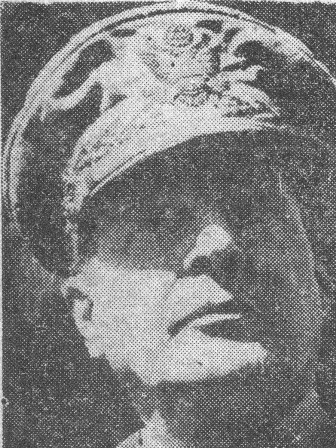
Gives Japs Orders |
The MacArthur announcement followed a brief 24-hour conference at Manila between a 16-man Japanese delegation headed by Lt. Gen. Kawabe, vice chief of the enemy general staff, and staff members of the MacArthur command. MacArthur himself, described as having a cold, aloof attitude towards the Nipponese, handled all negotiations through subordinates and refused first hand contact with the Tokyo mission.
STATE OF TRUCE
U.S. Headquarters spokesmen emphasized that for the present only a technical state of truce existed and that until the Allied entry into Japan no formal surrender will be signed. MacArthur will be accompanied by British, Chinese and Russian representatives to the surrender table, by Army News Service reports indicated that only American forces will be present in the initial occupation.
American spokesmen said they had received the technical data necessary for landing of occupation troops and described the Japanese mission as having given the full details needed by MacArthur. The Jap envoys were told the date that MacArthur and his forces intend to arrive in Japan.
The Japanese Government, after stating that the Manila mission had returned, announced that occupation troops would land by air on Sunday, 20 miles southwest of Tokyo. It was added that naval landings would follow on Tuesday at Yokosuka area in Tokyo Bay.
Japanese forces throughout the world were seemingly awaiting further orders before making any mass surrender gestures. The situation on the various fronts were still confused, with China presenting the biggest dilemma due to counter-claims by Communist and Chungking troops. Here was the situation at press time:
‘FEAR AND DESPAIR’
Japan - MacArthur was officially notified that forces are being kept under arms to maintain order. Tokyo radio warned that many of the Jap military might "forcibly resent" the occupation. The Tokyo newspaper Asahi spoke of unrest, fear and despair throughout the enemy homeland. Minister of Justice Iwata warned that the future will be different because Japan is now a defeated nation. Prince Higashi Kuni, the Emperor's cousin, has been told to form a new cabinet, making the first time a member of the royal family has headed the Government.
Pacific - No ground, air or naval activity. In the Philippines overtures were reported from two Jap generals on Luzon. Enemy officers had appeared with white flags at Australian Headquarters on Bougainville, but no contact was reported by the Aussies on New Britain. In New Guinea the Nips were reported to have accepted the surrender terms. The Japs earlier reported an Allied landing attempt in the Kuriles and asked MacArthur to cease operations there. American reconnaissance planes were twice fired on over Tokyo.
CHINA SITUATION
China - Army News Service said the situation was tense. The Japanese General Staff has asked MacArthur to investigate the situation there. The Japs claim Chungking and Communist troops are "rushing unwarrantedly and without discipline" into Jap-held regions. The Nips say both side separately demand disarmament. The Jap commander in China in the meantime had accepted the plan of Chiang Kai-shek for formal surrender. (London sources reported China's Foreign Minister, T. V. Soong, had appealed to the U.S. and Britain to urge Russia to put pressure on the Communists "to prevent civil war.")
Burma - Lord Louis Mountbatten ordered a cease fire order last week. Leaflets have been dropped explaining the surrender terms to the enemy. No surrender contact has been reported. From Singapore, the Jap army commander said the Emperor's will would be abided by, but that the Nip armies have unchallenged dignity and that they are determined to crush the enemy. (This contradictory statement could be based on bad translation, since it was monitored from Singapore radio.)
KWANGTUNG QUITS
Manchuria - The Soviets said fighting had stopped five days after it was officially announced Japan had accepted the Allied surrender terms. The Kwangtung Army was said to have ceased resistance. Surrender talks were believed to be going on at the headquarters of Marshal Alexander Vasilevsky. Soviet air-borne troops were in Harbin, Mukden, Kirin, and Tientsin. Over 97,000 Japanese had surrendered at last reports. Earlier the Japanese appealed to MacArthur to have the Reds cease their attacks.
Vehicles May Continue To Roll Over The Road
By SGT. JOHN McDOWELL Roundup Staff Writer
CHUNGKING - Contingent upon approval of the War Department, the flow of Lend-Lease vehicles over the Stilwell Road from Ledo, Assam, to China will continue despite the end of the war, Lt. Gen. A. C. Wedemeyer, China Theater commander, told the press this week.
Although terms of Lend-Lease legislation stipulate that delivery of Lend-Lease goods will cease upon cessation of hostilities with Japan, Wedemeyer pointed out that China has consigned stockpiles of trucks, weapons carriers and jeeps still in India which could be utilized in solving the current transport problem of U.S. Forces in China.
"Continued delivery of these vehicles to China would not constitute a breach of Lend-Lease, for the equipment would be for U.S. Army use in carrying out the post-war mission in this Theater of assisting in the re-deployment of Chinese troops and deportation of Jap troops and civilians to their homeland," Wedemeyer said.
The general added that he had wired the War Department for further instructions as to disposition of Lend-Lease equipment still in India awaiting shipment to China.
Other points brought out by Wedemeyer in his first press conference since the end of the war were:
Officers and men should be sent home as rapidly as practicable. The China Theater hopes to start the first groups of men on their way home within the next two weeks.
The first groups to return home will be channeled through Indian ports, but later China ports also will be utilized.
American China Theater Headquarters will be moved to Shanghai in the future. All G.I. installations will be closed up gradually.
There is a strong possibility that American military missions will remain in China to assist in training Chinese armies.
By the time the war ended China was developing a large and powerful Chinese fighting force, American trained and equipped. Twenty divisions had already been completely equipped and trained. By spring of 1946, 19 more divisions would have been added to this modern army.
Wheeler Sweats Out End; Talks About Going Home
By M/SGT. FRED FRIENDLY Roundup Field Correspondent
The General sipped coffee and read through the sheet of War Department messages. Then the plane's radio operator, Cpl. John J. Moore, stepped down from the flight deck, touched the General's shoulder for the 10th time during the 10-hour flight from Ceylon and said, "It ain't over yet General."
The "old man" removed his horn-rimmed glasses for the 10th time, smiled and said, "Okay corporal, keep us posted."
Thus did three-star Gen. R. A. Wheeler sweat out the ending of the war as his C-54 carried him back to Delhi. Having hitch-hiked a ride with the General, it seemed a good idea to ask him some of the questions which just about every G.I. would now like to ask his Theater Commander.
Reporter: General, when do we pack our barracks bags?
General: That's a good question, but I doubt if there is anyone who knows the answer. This I will say: If this is the end, I am now faced with one of the most difficult and yet the most pleasant assignments of my life - that is returning the men and officers of the I-B Theater to their homes as quickly as possible.
Reporter: Will we go home by units or as individuals?
General: I believe that demobilization will work, at least in the early stages, on the point system. That is, the goal will be to get those men home first who most deserve to go, regardless of the unit to which they belong. First, the men with the most points, 85 or more, then working slowly down to lower scores. Some units may, of course, go home as units, by first transferring out low-score men and then transferring in high score men from other units. Of course, some units here and there might get a break for some reason, but generally the attempt will be to keep the system as fair as possible while still returning our personnel as quickly as possible.
Reporter: What about the mission of this Theater?
General: I should say it will continue only until the vital ports of China are open to Allied shipping. And speaking of the mission of this Theater - if the war ends now - I think it safe to say that no group of men in the world will have done more to beat the Japs than our boys over here. We will have been the only Theater, in conjunction with China, to defeat the enemy on the Asiatic mainland that is, we and our Allies. We can now safely say that we helped to keep China in the war by flying the Hump and opening the Stilwell Road. Our Air Forces completely destroyed the Jap air force in Burma; we gave the B-29's their first roosts from which they might bomb Japan; we trained a great Chinese Army. I think it's safe to say that except for the men in Europe and the Pacific who were shot at and hit, there is no American on the face of the globe who did more to win the ear than the G.I. in our India and Burma jungles.
Reporter: General won't there be many more ships to take us home if we don't have to re-deploy our Armies to the Pacific?
General: To a certain extent, yes; but we are going to occupy Japan and those troops will have to be lifted and supplied. Also, there are still many troops in Europe and there will be plenty to go home from the Pacific. However, this surrender will release ships for use to get the men home; probably not too many at first but increasing steadily.
I promise you that I am going to do everything in my power to get you out of here just as soon as possible. But it is going to take time. Shipping space will be at a premium and we'll have to be patient.
Reporter: Well, then, if it is going to be months before some of us go home, what do we do while we wait?
General: We keep doing our jobs. Those so instructed will begin to inactivate their units and take care of their equipment. With the end of the war here the Special Service officer and the Information and Education officer become extremely important staff members in a unit. I urge unit commanders not to underestimate the vital issue of morale.
Reporter: When do we close up the Roundup?
General: When the last ship leaves India. The Roundup, which we started in 1942, is still a crackerjack soldier newspaper and will remain in business as long as there is a G.I. to read it. And you can tell the staff for me, just so long as there is a Roundup, it will remain free and the sacred organ of the men who read it and write it.
Reporter: How many points have you got, General?
General: I think 144, and no chance of getting home for a while, I'm afraid. But I was just thinking that this is the time for all good generals to give added consideration to how they treat the men in their command. I remember a story I once heard about two soldiers who were being court-martialed for kicking a general in the seat of the pants. One of the defendants was a master sergeant. He had 29 years of service, all kinds of medals and a wonderful record. He admitted kicking the general but couldn't explain why. He said he saw the general bend over and that some involuntary reaction caused him to kick. Well, the court believed the sergeant and, because of his wonderful record, decided to acquit him.
Then the court turned to the private and said, "But you, soldier, what excuse have you?"
"'Well sir, I was just walking by and saw the sergeant kick the general and I thought the war must be over. So I took my turn.' Yes sir, we had better watch our step." And the General laughed heartily.
Cpl. Moore, the radio operator: "Just got another flash from BBC. It's not over yet, General."
General: "Okay, corporal, keep us posted."
As did millions of dogfaces, so did a three-star general sweat out the greatest story of our day.
I-B Men Play Part Well, Says Theater Commander
Theater Commander Lt. Gen. R. A. Wheeler broadcast the following message after acceptance of peace terms by Japan:
World War II is over. The greatest conflict in the history of mankind has ended and we have won. Together with our Allies we have crushed those who hoped to dictate peace terms in the White House.
Our achievement has required the assembling of men and material in quantities heretofore unknown. It has necessitated transporting them all over the globe and to places many of us had never heard of before this war. Americans have had to give more generously of their money, their labor and their very lives, than ever before in our history.
‘JUSTLY PROUD’
The officers and men of the India-Burma Theater can justly be proud of the part they have played in this great victory. One of the most difficult and brilliant chapters of this war was written in the mountains and jungles of Assam and Northern Burma. The Stilwell Road, which was carved out of those mountains and jungles is one of the war's outstanding feats. The air route over The Hump will go down in history.
Efficient execution of the often unglamorous but arduous job of supply has been one of the major factors in bringing our enemies to their knees. To every woman and man of this command go my heartfelt congratulations and deepest gratitude for a difficult job well done.
In our rejoicing we should remember those whose sacrifices have prevented them from sharing in this victorious honor. To them belongs the fullest share of glory. They have left us with a great responsibility, and we must see to it that they have not died in vain.
RETURN HOME
Our eyes and our hearts now turn towards home. However, frankness commands me to warn you that we cannot all go home immediately. It is impossible to get everyone home as rapidly as he or she would like. We must finish our job of disposing of the supplies and material now in this Theater. In addition, our return home is dependent on transportation facilities which must be shared by all theaters. These transportation facilities are not sufficient to move everyone home at once. But you have my assurance that the completion of our task in this Theater and your return home will be carried forward as rapidly as humanly possible. To accomplish this objective quickly requires of all of us soldierly effort, patience, confidence, and discipline.
may this day bring you and yours the happiness and contentment that goes with the knowledge that you have played the game with all your might and won.
‘Scavenger Convoy’ To China
|
By SGT. JOHN McDOWELL Roundup Staff Writer
KUNMING, CHINA - Convoy Commander. That's a title which, to the uninitiated, suggests a job filled with storybook romance and excitement.
But, take it from Capt. Henry G. Kelly, Convoy Commander and Pain-In-The-Neck are synonymous. And Kelly should know.
Kelly, a wiry, thirtyish native of Lexington, Ky., with sparse, graying hair and a perpetual worried frown, has been running convoys into first Burma and then China for the past 21 months.
When I met Kelly ion the Kunming Motor Transport convoy area, he was slouched wearily behind the wheel of his muddy jeep, watching his men check their trucks after a 1,079-mile grind from Ledo, Assam. His eyes were bloodshot from long hours on The Road. His green fatigues were spattered with dust and mud and grease. A four-day growth of whiskers added a dispirited Bowery touch to his gaunt face.
NO MARCO POLO
Kelly snorted derisively when I asked him if he felt like a 20th Century Marco Polo leading truck caravans into China. "Maybe that Marco Polo character found glamor in China," he snapped. "But all I've found is long hours over lousy roads and new worries about trucks and personnel.
Kelly, whose Negro Quartermaster trucking outfit has been placed on the China convoy run, had just completed his second trip over Stilwell Road to Kunming. And this time he had drawn the assignment which all convoy commanders dread - bringing a "scavenger convoy" to China.
A "scavenger convoy" is just what the name implies. The convoy is formed in Ledo of vehicles which had been deadlined for repairs in Ordnance. Extra drivers ride in each of these machines, and all along the route other deadlined vehicles are taken out of Ordnance shops, supposedly repaired, and added to the convoy. This pickup practice continues until the supply of extra drivers is exhausted.
MOTLEY ASSORTMENT
Kelly left Ledo with a motley assortment of dilapidated vehicles - GMC's, Studebakers, weapons carriers, jeeps and British lorries. He reached Kunming with more vehicles than he had started with but had dropped so many off along the line for repairs and picked up so many other "secondhand" jalopies from various Ordnance garages that he couldn't recall just how many of the original convoy vehicles reached Kunming.
"A scavenger convoy means trouble all along the way," Kelly said. "Our wrecker was busy all the time, towing trucks as far as 80 miles to get them into Ordnance shops. The British lorries gave us the most trouble, for we never had parts for repairs when they broke down."
Kelly pointed out that, despite all the headaches of a convoy commander - worrying about convoy discipline, investigating accidents, keeping record of all the vehicles, looking out for the well-being of his men and a myriad of other major and minor annoyances - the motor officer and his crew have the toughest job on a convoy.
BEST IN BUSINESS
Lt. Teofil Marynick, a veteran of 16 years in the Army, is Kelly's motor officer. His crew, the Polish Regular Army man brags, is the best in the business. And T/4 Albert Hort, motor sergeant; T/4 Walter Smith, T/5 George Marshall, T/5 Vincent Cook, T/5 Johnny Tinsley, T/5 Russell Allen, T/5 James Brown and Pfc. Samuel Langley are constantly performing minor miracles to back up Marynick's boast.
A quick look at Kelly's record for the scavenger convoy trip revealed plenty of reasons why convoy commanders accumulate gray hairs and worried frowns. Her are a few:
(1) Convoy held up several hours by bridge washout at a river. Heavy rains soaked jungle hammocks. Little sleep.
(2) Another temporary layover at bridge washout south of Lungling. Drivers and trucks haul timbers for Chinese engineers to expedite repair of bridge.
INGENIOUS WINCH
(3) Trouble getting big trucks around few sharp curves at another point. Pfc. Robert Marshall rigs up ingenious winch to get trucks around one particularly bad curve. Transmission on GMC goes out midway down gorge. Cpl. Tinsley takes transmission out of old wrecked Burma Road truck which had been abandoned at least three years ago and puts it in GMC. Runs like new again.
(4) Leaving Paoshan after three and one-half day layover to get the old convoy "wrecks" in decent enough repair to limp on in to Kunming.
(5) T/5 Johnny McNey and T/5 Isiah McKee failed to make an appearance with their truck at Yunnanyi convoy area this evening. Thought sure they'd gone over the side of The Road somewhere back in the hills. Spent four hours riding up and down road looking for signs of mishap. At 10 pm, they called in from a convoy area 90 miles down The Road , and said they had missed Yunnanyi parking area and had gone on to next stop. Chalk up a few more gray hairs.
300TH FLAT
(6) Another milestone. T/5 Johnny McNeal, our flat tire specialist, repairs 300th flat of the trip. More trouble with fan belts on British lorries.
(7) Kunming at last. Everyone is exhausted. Road seems rougher than our last trip. Now to get the conglomeration of deadlined wrecks accepted by China Theater. At least a three-day job.
Despite his many troubles, however, Kelly brought the convoy through without an accident. This safety record was no mere coincidence, for Kelly and his veteran Negro drivers recently were commended for their outstanding convoy discipline.
"I've got a top outfit - a seasoned gang of real drivers," is the way Kelly explains his safety record. "Men like S/Sgt. Marion Goode, who as truck master is my right-hand man; S/Sgt. Floyd Bateman, S/Sgt. Arthur Bradford, Cpl. Charles Lester, Cpl. Allen Jackson, T/5 Dilmon Washington, T/5 Martin McWay, Pfc. Joseph Jordan, Pvt. Noy Jackson and all the others use their heads, obey orders and keep the trucks rolling."
MAIL AT LAST
Lt. Francis Bordeaux, Kunming Motor Transport officer, drove up suddenly in a jeep, bearing a huge handful of ominous-looking tally-outs. "I want to see you, Kelly," he said.
Kelly groaned, "now the goddam paperwork begins. Nothing but headaches in this racket."
"Are you sure there isn't anything worthwhile in running convoys to China?" I asked.
Kelly ruffled a couple dozen of the offending tally-outs and pondered. Finally he said, "Well there's always a big stack of mail waiting when we get back to Assam."
AWARD FOURTH DSM TO LT. GEN. SULTAN
WASHINGTON - (UP) - Lt. Gen. Dan I. Sultan became the first Army man to receive four Distinguished Service Medals when Chief of Staff Gen. George C. Marshall gave him a third Oak Leaf Cluster for "exceptionally meritorious and distinguished service" as India-Burma Theater Commander.
Hump Traffic Will Continue: Stratemeyer
By SGT. JOHN McDOWELL Roundup Staff Writer
CHUNGKING - Air traffic over The Hump will continue for an indefinite time, with particular emphasis given to the transport of aviation gasoline, Lt. Gen. George E. Stratemeyer, commander of the USAAF in the China Theater, told the press this week.
The big job of the Air Force in the China Theater, Stratemeyer pointed out, would be the rapid transport by air of thousands of Chinese troops into zones of occupation.
As for getting the Air Force men home, Stratemeyer said: "We want to get every man in the AAF back to his home and family as quickly as possible. But the occupational requirements, plus the assistance which we still have to give to the Chinese Air Force, will keep some of us here for some time.
"However our personnel members are working day and night to get the most deserving members back to the States as expeditiously as possible."
Wainwright's Ambition Voiced By UP Writer; Bataan Chief Freed
CHUNGKING (ANS-UP) - Expected here momentarily is the most famous of America's estimated 17,000 war prisoners, Lt. Gen. Jonathan M. (Skinny) Wainwright, held by the Japanese since the fall of Corregidor in 1942.
The commander of the American forces in the heroic last-ditch defense of the Philippines was found Aug. 16 by a volunteer "humanitarian team" which parachuted near the camp where he was imprisoned, 100 miles from the Manchurian city of Mukden.
Four members of Lt. Gen. Jimmy Doolitlle's Tokyo raiders were also liberated by U.S. paratroops at Peiping.
Lt. Gen. A. C. Wedemeyer, U.S. Commander in the China Theater, announced that several teams were dropped near prisoner of war camps on the Chinese mainland.
Wedemeyer added that Wainwright may be able to witness the formal surrender of the forces which held him more than three years.
Meanwhile, United Press War Correspondent Frank Hewlett, asked about Wainwright, said that "on more than one occasion he told me his ambition was to command the American army of occupation in Japan. He believed he could treat the Japanese firmly but fairly and erase the military influence from their lives."
Hewlett flew to Mindanao on Wainwright's orders just prior to the fall of Bataan.
Hewlett said one of the last things he heard Wainwright say was, "I'm just a field soldier and don't ever expect to be a big shot like Gen. MacArthur. But I do think I could handle the army of occupation."
"I've never before told about Wainwright's ambition," Hewlett explained, "because it might have caused Jap reprisals."
‘Jedge’ Fenn Describes N.Y. During Celebration
By T/7 OSMOSIS FINK
Among the milling, exuberant millions in New York City who jam-packed the streets in celebration of Japanese surrender was Brig. Gen. Clarence (Jedge) Fenn, I-B Theater Judge Advocate, who returned to his post here during the past weekend after 45 days TD.
"Damndest thing you ever saw," chortled the general. "The announcement came at 7:03 in the evening and the streets mushroomed with cheering throngs in what seemed a twinkling of the eye.
"I couldn't get near Times Square - where, the papers said, upwards of 1,500,000 persons gathered - but I did manage to get as far as 52nd St. and Fifth Ave. It was an amazing sight. Leaves torn from telephone books, confetti, and streamers descended from the upper floors of buildings. Soldiers and sailors kissed girls - and a few of them got slapped, may I add. Horns honked. Human serpentines wove through the massed streets. Bells clanged. Whistles shrilled. It was wonderful.
"There weren't many drunks. One reason, of course, may have been that the announcement wasn't made until evening. People were emotionally stimulated, but well behaved. I didn't see a single instance where a policeman had to step in and assert the majesty of the law.
"No, I wasn't kissed by any girls. Had my wife with me. That might have been the reason.
"Most indelible sight I saw was an American WAC waving an American flag, walking arm in arm down the street with a British Tommy, waving a British flag. People made a path for them and cheered and shouted and laughed."
Timing of the surrender was perfect for the general, who was scheduled to leave from LaGuardia Field for India the following day. Fenn, who arrived in CBI during March 1942, perhaps holds the longest period of service among American Army personnel this side of The Hump, except for Lt. Gen. R. A. Wheeler.
Did the general, the Roundup asked slyly, take a little nip of something alcoholic, say one or two, by way of celebration?
"Well, the wife and I had a couple of Manhattan cocktails," he confessed.
"After all, I represented the India-Burma Theater in New York."
Tokyo Rose Back On Air
SAN FRANCISCO (ANS) - Tokyo Rose was back on the air this week after a few nights absence following the Japanese surrender.
The enemy siren, whose record collection has made her the favorite of music-hungry G.I.'s in the Pacific for many months, still had plenty of music and that soft familiar voice, but the name of her program had been changed from Zero Hour to Pacific Hour.
Ledo G.I.'s Celebrate Victory, But Thoughts Of Home Sober Spirits
LEDO - Though the news of the Japanese surrender was an anti-climax here, G.I.'s were wildly enthusiastic and quickly responded to the victory. Locomotive whistles were pulled wide open, blasting the news to waking soldiers.
It was announced over the Ledo radio station that the day would be a holiday and that only fatigue and vital duties were to be carried out. A Special Service unit was hastily rounded up, a band placed on a 6x6, which toured the area from Margherita to Lekhapani, knocking out jive and military numbers in a frenzied mixture.
A chota peg Indian boy, mascot around headquarters, turned up in a snappy starched G.I. uniform and handed out snappy salutes to the brass. Jeeps appeared with air-dropping parachutes draped on hoods and sides and one had a packed barracks bag decorating the radiator.
G.I. REACTION
A few G.I.'s were picked at random and their reactions sought on the end of the war. Here they are:
S/Sgt. John F. Cessnun, Dalhart, Tex., has been a muleskinning platoon sergeant with the 31 QM Pack Troop most of his 17 months overseas. One of the Galahad replacements for the Marauders, he had walked the mules to a point near Bhamo. He was walking the combat veteran mules to Kunming when he contracted scrub typhus and was evacuated from Yungpe, China, to the 20th General Hospital. Still pale and thin, Cessnun hardly felt like talking. "I was excited for a while," he said. "Then I started thinking about getting home. I don't know when I'll get out. I just don't know what to think." But you got the idea he was very, very glad.
Lt. Jennie Roberts, Williamston, S.C., nurse, is one of the few nurses now in the 20th General Hospital who have over a year of overseas duty. "It just gave me goose pimples," she said. "I smiled and grinned all over the place. Some of the girls started packing, keeping out only one uniform to wear home, and then we really celebrated. I've got a lot of business to take care of at home, when my husband gets home from the Navy."
SICK AT FIRST
Sgt. Richard Crockett, New Britain, Conn., Negro assistant convoy commander who has been overseas 24 months, and has made two convoy trips to Kunming, said, "I was sick when I first heard the news, but I felt better immediately. Don't know much about peace terms, but I know that I've got a good job waiting for me at home, and I want to get back to it."
S/Sgt. Erwin W. Steidemann, St. Louis, Mo., a surgical administrative NCO with 31 months in the I-B Theater, all spent at Ledo, said, "It's not over for me until I get out of uniform. Naturally I want to get home and tour the country for a couple of months. But this is an anti-climax. I knew when the used the atomic bomb and the Russians entered that it was over. I hardly see how they can get me out in less than six months. I won't feel like it's over until I get into a civilian suit."
‘GOOD NEWS’
Sgt. Joseph Andrews, Negro G.I. of Wareham, Mass., was getting ready for his third trip to China as an assistant convoy commander when he heard the news. "I damn near went crazy," he said. "I couldn't believe it. The peace sounds O.K. I don't give a damn what they do with the Emperor, just so I get home and see my kid."
T/5 Lucius McClendon, Chicago, a Negro mechanic, who was getting ready for his third trip to China with a convoy, said "I just wanted to start packing and get. In my 24 months over here I've never heard such good news. Hope they got a transport down at Calcutta."
ARC May Harper, Evanston, Ill., Negro club director at a Ledo Red Cross canteen, said, "I'm so glad it's over. Now these splendid boys can go home and pick up where they left off. This is my second war. I hope that they make it the last one. I don't know how it will affect the CBI, but we are going ahead with our expansion program and try to make the boys' last days over here just a little better."
SAVES SCOTCH
S/Sgt. Harold E. Olsen, Waltham, Mass., in charge of pipeline maintenance in a long stretch along the Hukawng Valley, voiced determination that this should be the last war. "Veterans should organize for the sole purpose of preventing a recurrence of this ghastly mess. We can never recover the time we have lost here, but we can make sure that other generations will not have to do the same. Twenty-one months I've had over here to think, and although I'm not a preacher, I'll always be willing to say a word against war. Have another scotch. I've saved it more than a year for this occasion."
Sgt. Irving L. Gubermick, Yonkers, N.Y., a motor pool sergeant, has been in the Army three years and 18 months overseas. He has seen combat with the Enemy Equipment Intelligence Service attached to the British 14th Army in Central Burma. He said, "Now I can go home. I'm gonna start my own garage. Settle down and enjoy myself. I believe it should have been unconditional surrender. I think the Emperor should be tried as a war criminal. We can thank the navy, Marines, and Army - and the atomic bomb."
Here's A Couple Of Characters Who Miss India
NEW YORK (UP) - One of the saddest sights to be seen during Manhattan's phenomenal victory blowoff was of two veteran India hands who wanted to be back in the land of mystery celebrating the Japanese defeat with their comrades. (Editor's note: Pardon us while we treat our prickly heat.)
Maj. Melvyn Douglas and Daniel Berrigan of the New York Post sat on a lush couch in a snazzy New York apartment holding ice cold scotch-and-sodas and surrounded by beautiful, joyful women but they were almost tearful as they assured Roundup's New York correspondent that the only place they wanted to be was India.
‘MY BUDDIES’
Douglas wanted to be in Calcutta while Berrigan wanted to be in New Delhi. Douglas, taking another swig, said, "No kiddin' - the only place I want to be at this moment is with the guys in India. I've spent two years there and they're my pals."
Berrigan moaned as follows, "Gee, if only I had a party going in my old apartment at 9 Wenger's Flats." Despite being surrounded by really beautiful, expensive, charming, friendly women Berrigan and Douglas spent most of the evening at the gay party with their arms around each others necks, talking about India.
NEEDS T. S. SLIP
Berrigan, recently banned from China, said he is now going to Australia, he hopes. The Far East editor of the New York Post has found it impossible to get accredited to MacArthur's command at present because there are enough correspondents in Manila. (Editor's note: We suggest the Post accredit Berrigan to the Roundup and replace one of us guys. Anyone who hangs around Douglas' neck with a roomful of beautiful women has been in the States too long.)
Stilwell Writes ‘Why We Fight’
Roundup Staff Article
"Uncle Joe" Stilwell, always suspicious of words of more than two syllables, this week wrote the dialogue to a play entitled, "How the G.I. Feels About the War And It's End."
Stilwell was asked the question by the N. Y. Times on Okinawa and answered it in longhand as follows, entitling it Why We Fight:
The characters: A highbrow and a G.I.
The scene: Anywhere.
Highbrow: What is it you men are fighting for?
G.I. The Japs jumped us and the Krauts joined in. We had to smack them down.
Highbrow: Yes, yes, but what is the ideology behind the action? Are you fighting for democracy, or your way of life, or the Four Freedoms, or the Atlantic Charter, or what?
G.I. Hell, buddy, I dunno what you're talking about. The war started and we got drafted and here we are. Would you want us not to fight the Nips? This is our job."
After a good deal more dialogue, the play ends with the G.I. explaining, "We gotta keep the people from going to extremes. When they go to extremes that means they start pushing us around and we ain't having any of it. A mess sergeant went to extremes once and gave us Spam six times a week. So now we gotta new mess sergeant. Now do you know what we're fighting for?
Highbrow: I believe I do. Twas enunciated by Confucius 2,500 years ago and he called it the doctrine of the mean.
G.I. Well, I'm sure glad you've got the name of it. Great people those Chinese.
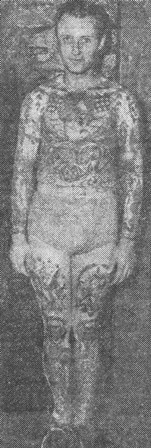 SGT. THOMAS STEPHEN
SGT. THOMAS STEPHEN
Colorful Chap |
|
Roundup Staff Writer
After five successive night trips over The Hump, Sanderson confided to his bashamate that he was sick and tired of night flying and would like a day trip. Mohammed overheard his bossman's lament and zipped over to the Operations shack to see "the burra-sahib."
"My sahib making too many night trips," said Mohammed. "Him damn tired - him want day trip."
Sanderson got his day trip. Mohammed, baksheesh.
'TAIN'T FUNNY!
T/3 Ralph J. Somerville, staff cartoonist for Roundup, always is paying out rupees to see his own work.
The Finance Department comes forth with his salary regularly and sometimes the Air Corps greases his palm for illustrating some of its propaganda, but the Delhi movie houses are where the outgo comes in.
Tickets are Rs. 2 each, and by now Somerville is used to seeing some of the cartoons he did more than a decade ago. When he saw Tail End, one he did in 1933, not long ago, he blew his top.
"If history repeats itself," said the "goofy" expert, "I'll be buying copies of the Roundup in 1955."
ATC Private Has Varied Career As War Pilot
ASSAM - Pvt. Oscar M. Clevenger probably has flown as many varieties of trainer planes, cubs, fighters, bombers and transports as any man in the India-China Division of the ATC - and he's still holding the rank of the seventh Army grade.
At present assigned as an airplane mechanic at an ATC bas here, Clevenger has behind him one of the strangest, most involved and most varied careers to come out of the war.
With a license to pilot any single or multi-engine plane up to 6,000 horsepower, he has more than 2,400 flying hours, including 245 hours of combat time as a Spitfire pilot and 125 hours of first pilot time in a C-46.
Enlisting in the RCAF, Clevenger piled up a lot of flying time mostly in a British Spitfire over Germany. He also did some RCAF ferry-piloting. He also has accumulated time in private flying, test piloting for Curtiss-Wright, and flying freight, passengers and mail for the Arctic Air Freight in Hudson Bay, Canada.
Reinducted into the USAAF in January, 1944, the private has been sweating out a Flight Officer's commission ever since.
Born in Canada with derivative American citizenship, he has three years of college work in aeronautical engineering.
Some of the planes Clevenger has flown are the German Junkers, Messserschmitt, the Japanese Zeke, British Havoc, Hudson, Hawk, Bristol fighter, Tiger Moth, American P-39, P-40, P-47, P-51, C-46 and others.

|
I-B Sports Program Moves To High Gear
India-Burma troops, already equipped with one of the best overseas sports programs ever activated, this week launched forth on a four-pronged acceleration of the existing schedule in a series of sports that will culminate in Theater-wide championships, it was learned from Lt. Col. Wesley Gritton, Theater Special Service officer.
"We have the supplies to bring a full program of sports to every man in the theater now," said Col. Gritton, "and with the increase of leisure time which is expected soon, there should be a general increase in every sport at every base in India and Burma."
Lack of supplies proved an early handicap to sports in I-B. Lack of aerial transportation was another drawback that prevented interbase and intersectional meetings. It is hoped to arrange air travel for sports teams in the future.
DATES NOT SET
Gritton pointed out that dates for the individual sports championships have not yet been set, these depending to some extent on how long it will take to determine sectional champions who would be qualified for the theater-wide meet. But sectional programs are rolling along.
The Theater is divided into four areas. The Advance Section, located at Ledo is directed by Capt. Eugene B. Vest. Capt. Ronald Joseph Savilla heads the Intermediate program at Chabua; Maj. John T. Trutter, is in charge of Base Section at Calcutta and also serves as Gritton's assistant, while Lt. Charles C. Thompson heads the ADMAC program for the Delhi area.
In practically every popular sport, champions will be determined in each of these four sections, with the winners and possibly the runners-up meeting in the Theater-wide contests to settle the India-Burma title.
It is probable that a similar program planned for the China Theater, will result in inter-theater meets in some sports and, also, there is some likelihood that I-B and China champions will join ETO titlists in a world-wide conclave.
TROOPS TO WATCH
Gritton said that championships would be held at several bases around the Theater, but always with the goal of making them accessible to the most troops to see, as this will be a feature of the accelerated program.
One leading item on the I-B sports calendar is the proposed Asiatic Olympics to be held under Major Trutter's direction at Calcutta in mid-December. This will include the usual track and field events, plus such other sports as are practical at that time.
Football and touch football leagues in the four sections are a new feature that will be introduced on a very wide scale. When this part of the program was adopted several months ago, the element of minimum leisure time appeared as a handicap, but the cessation of hostilities has given the football plans a big boost and both touch and regular grid leagues are expected to boom.
In addition to the extended sports program, Special Service is to continue its hobby activities and also has arranged for two mobile units, of a vaudeville nature, to tour along The Road, giving shows and distributing kits, magazines and small games. Their tour begins from Ledo.
DELHI DEFEATS AGRA IN SPORTS
Outscored in rifling and horseshow pitching, Delhi's soldier-athletes walked away with honors in golf, tennis, badminton and table tennis to capture Sunday's intercity sports show with Agra, 4-2.
Agra captured the barnyard golf matches, 17-1, tossing ringers in profusion, and on the rifle range posted a 1040 score to the 947 for Delhi's marksmen.
Delhi, led the tennis play, 3-2, when rain halted the sixth match in which Delhi led at the time. Badminton honors fell to Delhi in four straight singles while the teams split two doubles. Golf was closer than the last meet, Delhi winning, 16½ to 10½, while in table tennis, the local players won three of four matches.
|
FAIRY TALE
COL. GOLDILOCKS VISTS BEARS
By T/7 OSMOSIS FINK - Poor
Once upon a time there were three junior officers who lived in BOQ quarters in the middle of Delhi. They were so rough and gruff that all the G.I.'s called them "the three bears."
There colonel, who had bright yellow hair, was called "Goldilocks."
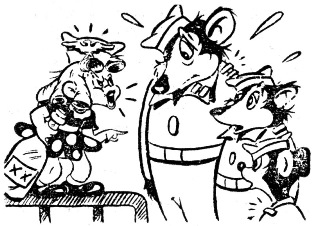
|
One day Goldilocks took a walk around Delhi. Soon he arrived at the BOQ quarters where the three bears lived. He decided to call an inspection.
He opened the footlocker belonging to the big bear, a captain. There he found a bottle of jungle ration. He opened it and took a drink. "Brrr!" he said. "This is too strong."
He opened the footlocker of the middle-sized bear, a first lieutenant. He took a drink from the bottle in there. "Brrr!" he said. "This is rotgut."
He opened the footlocker of the little bear, a second lieutenant. He took a drink form the bottle in there. "Yum Yum!" he said. "This is just right. No gasp, no burn, no belch." So he drank all that was in the bottle.
Weary from this effort, Goldilocks decided to lie down and rest. He tried the bunk belonging to the big bear. It was too hard. He tried the bunk belonging to the middle-sized bear. It was too soft. He tried the bunk belonging to the little bear. It was just right. "Oh boy!" said Goldilocks. "Now for some sack time."
Meanwhile, the three bears came home from work. "Who opened my footlocker?" growled the big bear in a big voice. "Who opened my footlocker?" asked the middle-sized bear in a middle-sized voice. "Who opened my footlocker?" questioned the small bear in a small voice.
"Somebody's been drinking out of my bottle," roared the big bear. "Somebody's been drinking out of my bottle, too," declared the middle-sized bear. "Somebody's been drinking out of my bottle," mumbled the little bear, "and they drank it all up."
"Somebody's been sleeping in my sack," cried the big bear. "Somebody's been sleeping in my sack too," said the middle-sized bear. "Somebody's been sleeping in my sack," squeaked the little bear, "and he's still there. Tenshut!"
Goldilocks woke up and saw the three bears standing at attention. "men" he said, "don't you (hic) know it isn't polite (hic) to stash away your jungle ration in your footlockers? Besides, it's better stuff than we colonels have been rationed in the last two months."
"Yes sir," said the big bear.
"Yes sir," said the medium-sized bear.
"Yes sir," said the little bear. Then when Goldilocks had sauntered towards Connaught Circle, he said: "Between these colonels and those damned Air Corps officers, it's getting so that a man can't keep a bottle around this place unless he carries it on him all the time."
The Roundup is a weekly newspaper of the United States Forces, published by and for the men in Burma and India, from news and pictures supplied by staff members, soldier correspondents, Army News Service and United Press. The Roundup is published Thursday of each week and is printed by The Statesman in New Delhi and Calcutta, India. Editorial matter should be sent directly to Major Floyd Walter, Hq., U.S.F., I.B.T., APO 885, New York, N.Y., and should arrive not later than Saturday in order to be included in that week's issue. Pictures must arrive by Friday and must be negatives or enlargements. Stories should contain full name and organization of sender. Complaints about circulation should be sent directly to Capt. Drexel Nixon, Base Section APO 465, New York, N.Y. Units on the mailing list should make notification of any major change in personnel strength or any change of APO.

AUGUST 23, 1945
|
|
Adapted from the original issue of India-Burma Theater Roundup
Copyright © 2015 Carl Warren Weidenburner
TOP OF PAGE PRINT THIS PAGE ABOUT THIS PAGE SEND COMMENTS
PREVIOUS ISSUE CLOSE THIS WINDOW NEXT ISSUE
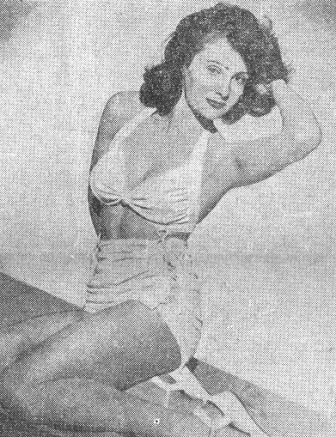 A former skater with Icecapades, Betty Ardell has put away her skates and now all she does is sit around and look pretty,
which she does very well, you'll agree. She's a Walter Thornton model and is just itching to give away her picture.
Write to her at 420 Lexington Ave., New York City. If a man answers, hang up.
A former skater with Icecapades, Betty Ardell has put away her skates and now all she does is sit around and look pretty,
which she does very well, you'll agree. She's a Walter Thornton model and is just itching to give away her picture.
Write to her at 420 Lexington Ave., New York City. If a man answers, hang up.
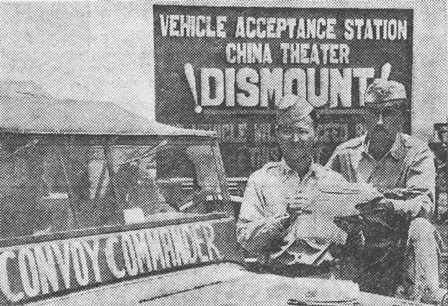 Responsibility of seeing that vehicles from India-Burma get to China over the Stilwell Highway is only part of the headache of Convoy
Commander Capt. Henry G. Kelly, CO of a QM Company.
Here Kelly frets over the vehicle tally-out papers with Lt. Francis Bordeaux at a Kunming acceptance station.
Responsibility of seeing that vehicles from India-Burma get to China over the Stilwell Highway is only part of the headache of Convoy
Commander Capt. Henry G. Kelly, CO of a QM Company.
Here Kelly frets over the vehicle tally-out papers with Lt. Francis Bordeaux at a Kunming acceptance station.
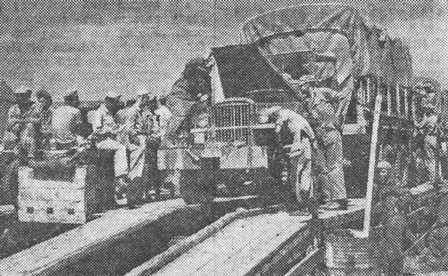 After making the 1,079-mile trek from Ledo, Assam, to Kunming, China, all China-consigned vehicles must be given a complete mechanical
check before being accepted by the China Theater.
Above, G.I. maintenance men, aided by Chinese mechanics, give a recently-arrived vehicle a going-over.
After making the 1,079-mile trek from Ledo, Assam, to Kunming, China, all China-consigned vehicles must be given a complete mechanical
check before being accepted by the China Theater.
Above, G.I. maintenance men, aided by Chinese mechanics, give a recently-arrived vehicle a going-over.
